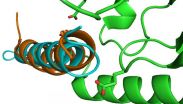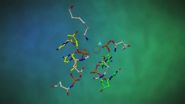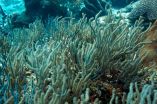Genes that cause pancreatic cancer identified by new tool
Screening system in mice spots cancerous changes invisible to sequencing
2014-12-08
(Press-News.org) A technique that can identify causes of cancer invisible to genetic sequencing has uncovered large sets of previously unknown pancreatic cancer genes. It is hoped that this study will boost research into a disease that is still poorly understood and for which five-year survival rates have stood at around 5 per cent for the past four decades.
The technique works by introducing sections of DNA called piggyBac transposons into the mouse genome. Transposons jump around within the genome, reinserting themselves at random and causing a different mutation in each cell of the mouse. This triggers cancer development, and tracking the transposon´s fingerprints in the tumours allows discovery of the affected cancer-causing genes. The PiggyBac tool was engineered for the first time to allow cancer induction in individual tissues within the mouse, and the method can now be used to study any type of cancer.
While genome sequencing can identify all categories of genetic alterations with high accuracy, some of these changes are difficult to interpret. For example, hundreds or thousands of genes are found to be transcriptionally or epigenetically dysregulated within a cancer, meaning that they are not mutated but just being turned on or off. Pinpointing the few cancer-causing events among these large gene sets is extremely difficult. PiggyBac screening can facilitate this search for the needle in the haystack because transposons jump directly into the relevant genes. Moreover, the tool monitors tumour development in mice and therefore researchers are also able to see the consequences of cancerous mutations and how they help the disease to progress.
"Recent advances in cancer genome sequencing have given extraordinary insights into the genetic events underlying cancer. Nevertheless, we are still far from understanding the complexity of the molecular processes driving cancer development," says Professor Roland Rad, from the Technische Universität München and the German Cancer Research Center. "Unbiased genome-wide screening in mice allows us to see cancer from a different angle and answer biological questions that cannot be addressed with other approaches."
The study has identified many genes previously unknown to be involved in pancreatic cancer, including Foxp1, which was hit by transposons at very high frequencies in the 49 mouse tumours studied. Where Foxp1 was induced, tumours spread from the pancreas to other organs, suggesting that the gene drives cancer progression. This finding was confirmed when researchers looked at human samples and found high levels of the FOXP1 gene product in cancers that had metastasised.
In a number of mice, transposons had become inserted in noncoding regions of the genome. These insertions pinpointed enhancer areas, which are involved in the regulation of cancer-causing genes. In addition, similarly to humans, mice developed various subtypes of pancreatic cancer, which not only have distinctive microscopic appearances but also show different clinical behaviours. The study discovered molecular processes being responsible for triggering the formation of these cancer subtypes.
Researchers will now be able to look more closely at the pancreatic cancer genes that have been discovered by this study in the hope of finding effective drugs for a disease that is set to be the second leading cause of cancer death by 2030. Laboratories have also begun using the technique to investigate cancers in other tissues.
INFORMATION:
Notes to Editors
Publication details
Rad R, et al. (2014) A conditional piggyBac transposition system for genetic screening in mice identifies oncogenic networks in pancreatic cancer. Nature Genetics. DOI:10.1038/ng.3164
Participating Centres
Technische Universität München, German Cancer Research Center, Wellcome Trust Sanger Institute, Instituto de Medicina Oncológica y Molecular de Asturias, Instituto de Biomedicinia y Biotechnolgia de Cantabria, University of Cambridge, University of Minnesota, The Netherlands Cancer Institute, Universität München, Universität Regensburg, Universität Dresden, Universität Insbruck
Selected Websites
German Cancer Research Center (DKFZ)
Technische Universität München (TUM) combines top-class facilities for cutting-edge research with unique learning opportunities for 38,000 students. TUM scientists are committed to finding solutions to the major challenges facing society as we move forward: Health & Nutrition, Energy & Natural Resources, Environment & Climate, Information & Communications, Mobility & Infrastructure. TUM thinks and acts with an entrepreneurial spirit. Its aim is ambitious: to create lasting value for society through excellence in education and research, the active promotion of next-generation talent and a strong entrepreneurial spirit. All of which combine to make TUM one of Europe's leading universities.
http://www.tum.de/
The Wellcome Trust Sanger Institute is one of the world's leading genome centres. Through its ability to conduct research at scale, it is able to engage in bold and long-term exploratory projects that are designed to influence and empower medical science globally. Institute research findings, generated through its own research programmes and through its leading role in international consortia, are being used to develop new diagnostics and treatments for human disease.
http://www.sanger.ac.uk
The Wellcome Trust is a global charitable foundation dedicated to achieving extraordinary improvements in human and animal health. We support the brightest minds in biomedical research and the medical humanities. Our breadth of support includes public engagement, education and the application of research to improve health. We are independent of both political and commercial interests.
http://www.wellcome.ac.uk
ELSE PRESS RELEASES FROM THIS DATE:
2014-12-08
ITHACA, N.Y. - There is cloud hanging over climate science, but one Cornell University expert on communication and environmental issues says he knows how to help clear the air.
In the December issue of Nature Climate Change, Jonathon Schuldt, assistant professor of communication, argues that only by creating a "science of climate diversity" can climate science and the larger climate change movement overcome a crippling lack of ethnic and racial diversity.
"There is an invisible, but very real barrier to climate engagement," Schuldt said. "We need to engage with all ...
2014-12-08
A genetic misfire called the 3q26.2 amplicon can cause real havoc. In fact, it is among the most frequent chromosomal aberrations seen in many cancers, including ovarian and breast cancers.
Researchers behind a study at The University of Texas MD Anderson Cancer Center believe they may have found a molecule-based approach to halting 3q26.2's destructive nature. By manipulating a non-coding microRNA (miRNA) known as miR569 that is part of the amplicon, scientists were able to increase cell death in vitro and in vivo. MicroRNAs are short, non-coding RNA molecules that are ...
2014-12-08
Alexandria, Va. -- Methane is often found naturally leaking from the seafloor, particularly in petroleum basins like the Gulf of Mexico or along tectonically active continental margins like the U.S. West Coast, but such plumes were not expected along passive margins, like the East Coast of North America. Now, however, the discovery of hundreds of methane seeps on the seafloor along the U.S. East Coast suggests that such reservoirs may be more common along passive margins than previously thought. The release of such methane globally may have a significant influence on climate, ...
2014-12-08
BLOOMINGTON, Ind. -- A new treatment for adult-onset diabetes and obesity developed by researchers at Indiana University and the German Research Center for Environmental Health has essentially cured lab animals of obesity, diabetes and associated lipid abnormalities through improved glucose sensitivity, reduced appetite and enhanced calorie burning.
In preclinical trials, the new peptide -- a molecular integration of three gastrointestinal hormones -- lowered blood sugar levels and reduced body fat beyond all existing drugs, according to the work co-led by IU Distinguished ...
2014-12-08
Scientists from the Spanish National Cancer Research Centre (CNIO), led by Guillermo Montoya, have developed a method for producing biological crystals that has allowed scientists to observe --for the first time-- DNA double chain breaks. They have also developed a computer simulation that makes this process, which lasts in the order of millionths of a second, visible to the human eye. The study is published today by the journal Nature Structural & Molecular Biology.
"We knew that enzymes, or proteins, endonucleases, are responsible for these double strand breaks, but ...
2014-12-08
Sexual behaviour of teenage girls does not appear to be impacted by the human papilloma virus (HPV) vaccine, according to Queen's researchers Drs. Leah Smith and Linda Lévesque.
There are concerns the vaccine, which guards against four types of the HPV shown to cause cervical cancer and anogenital warts, may give girls a false sense of security about contracting sexually transmitted infections (STIs) and lead them to engage in riskier sexual activity.
"These findings suggest fears of increased risky sexual behaviour following HPV vaccination are unwarranted and should ...
2014-12-08
When cancer is diagnosed, the grade of its malignancy is a central concern for both patients and their physicians. This value is used to determine how intensively and how radically the cancer must be treated. Particularly in the case of prostate cancer, the disease can take widely varying courses in different patients. Therefore, cancer researchers have been looking for measurable, reliable biomarkers that give clues about the aggressiveness of a tumor in order to choose an appropriate therapy.
In many types of cancer, alterations in a tumor's genetic material indicate ...
2014-12-08
MIAMI - A new study on tropical shallow-water soft corals, known as gorgonians, found that the species were able to calcify and grow under elevated carbon dioxide concentrations. These results suggest that Caribbean gorgonian corals may be more resilient to the ocean acidification levels projected by the end of the 21st century than previously thought.
An international team of scientists, including from the University of Miami (UM) Rosenstiel School of Marine and Atmospheric Science, tested the effects of elevated CO2 concentrations on the growth and calcification rates ...
2014-12-08
Study results of CD19-directed chimeric antigen receptor (CAR) therapy using the Sleeping Beauty non-viral transduction system to modify T cells has demonstrated further promise in patients with advanced hematologic malignancies.
Patients who had acute lymphocytic leukemia (ALL), non-Hodgkin lymphoma (NHL) or chronic lymphocytic leukemia (CLL) were part of clinical trials at The University of Texas MD Anderson Cancer Center, which used the Sleeping Beauty gene transfer system initially discovered at the University of Minnesota.
Results from the study were presented ...
2014-12-08
Low doses of fluoxetine - better known as the anti-depressant Prozac - could hold the key to preventing PMS symptoms, an international team of researchers has found.
Up to 80 per cent of women are thought to suffer from premenstrual syndrome (PMS), which can be a debilitating condition with symptoms such as anxiety, irritability, fatigue, sleep deprivation and increased sensitivity to pain.
PMS appears to be triggered by the fall in secretion of the ovarian sex steroid hormone progesterone that occurs towards the end of the menstrual cycle and leads to a decline in ...
LAST 30 PRESS RELEASES:
[Press-News.org] Genes that cause pancreatic cancer identified by new tool
Screening system in mice spots cancerous changes invisible to sequencing




